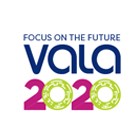How the Royal Society of Chemistry (RSC) is pioneering global open access and giving back to its community
VALA2020 SC8
Thursday 13 February 2020, 1:45 – 3:25
Paul Lewis
- Royal Society of Chemistry
Please tag your comments, tweets, and blog posts about this session: #vala2020 #sc8
View the presentation slides here:
Abstract
This session will provide transferrable knowledge and insights on how a leading learned society publisher is meeting the OA challenge and delivering value back to its community.
Across the scholarly communications landscape there is an increasing drive towards open access publishing, from individual advocates to larger organised efforts such as cOAlition S and their proposal for accelerating the transition, Plan S.
Plan S can only be successful if it rolls out globally – but researchers in different regions have very different needs and attitudes when it comes to open access. A recent survey of chemical science authors by the Royal Society of Chemistry (RSC) found wide variation in their current engagement with open access, their motivations for publishing venue choice, and their opinions of who is driving – and who should drive – a global transition to open access.
The RSC is a not-for-profit learned society and publisher. Its overriding mission is to advance excellence in the chemical science. We have been a significant driving force in open access chemical sciences publishing, and around a quarter of the ~35,000 articles we published last year were open access. Recent advances include:
- publishing the largest Gold open access journal in the chemical sciences, RSC Advances, which last year published over 4,600 articles
- making our flagship journal, Chemical Science, free to read and free to publish, with the RSC covering the article processing charges of this journal as part of its charitable aims to further the chemical sciences
- launching our third new fully open access journal, Nanoscale Advances, in 2018
- developing a Read & Publish model in partnership with our customers – a recognised stepping‐stone in the transition to open access
- not requiring authors to transfer copyright for any of the articles they publish with us (subscription or open access); our Gold open access journals publish under the CC‐BY license
- launching ChemRxiv, a chemistry preprint server co-owned with the American Chemical Society, the German Chemical Society and other not-for-profit organisations, provided free of charge to authors and readers
Learned society publishers like the RSC have an important and particular perspective: our publishing services have been shown to provide clear return on investment to researchers than commercial publishers, and our surpluses go straight back into supporting the research community through conferences, grants, recognition, careers support, public advocacy and so much more. Recent flagship charitable activities for the community include:
- Science Horizons, a comprehensive report on the global R&D strengths and opportunities in the next 10-15 years for the chemical sciences, based on engagements with more than 750 leading scientists worldwide
- Bringing together chemistry organisations from Commonwealth nations to form a Federation of Commonwealth Chemistry Societies, enabling stronger global representation from more countries
- Leading efforts to make chemistry more inclusive and celebrating our diverse community, including reports and campaigns on women’s progression in academia, the experiences of LGBT+ scientists and our recent analysis of gender bias in chemistry publishing.
This work is licensed under a Creative Commons Attribution-NonCommercial License.

